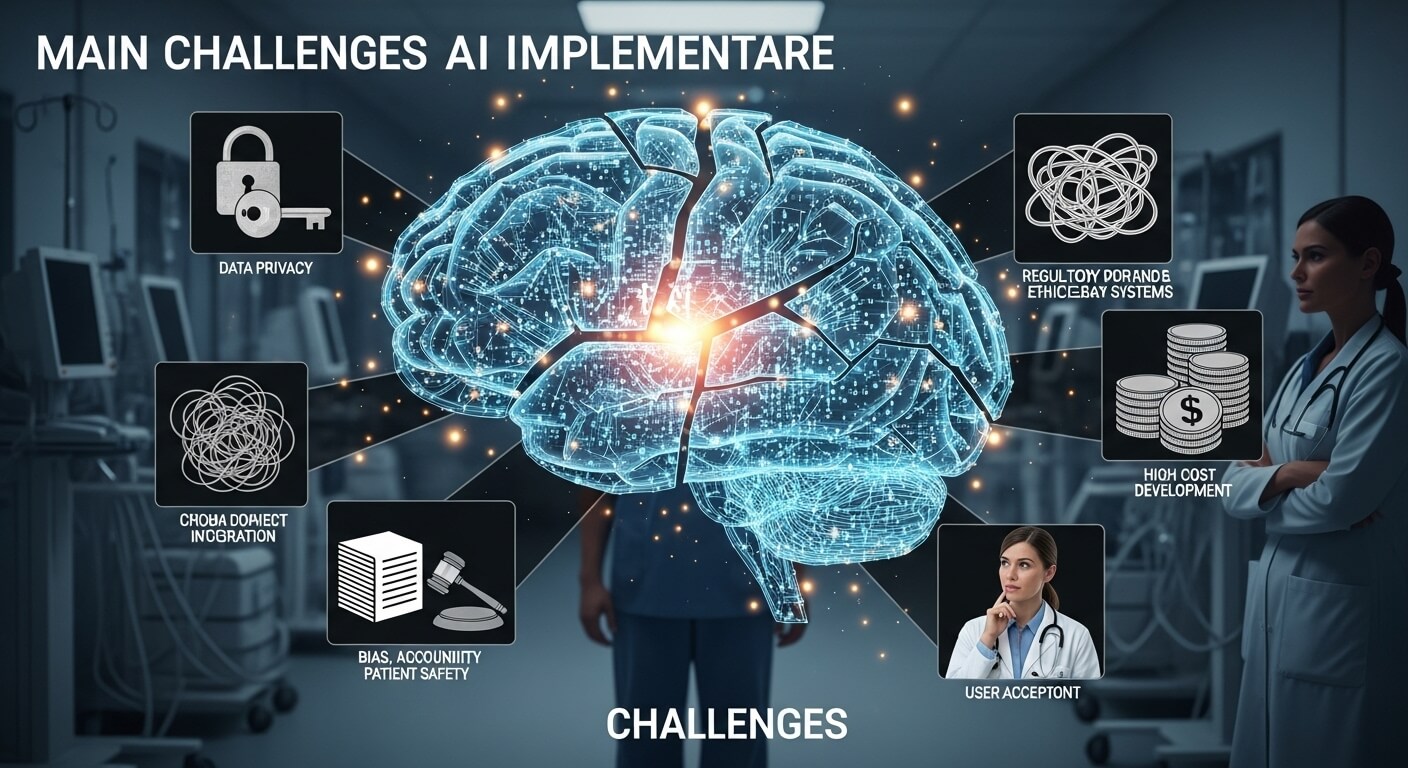Artificial Intelligence (AI) is poised to revolutionize healthcare, offering transformative applications like predictive diagnostics, personalized medicine, and streamlined operations. However, what are the main challenges in implementing AI in healthcare remains a critical question for stakeholders, including providers, policymakers, and technology developers. Despite its potential to improve patient outcomes and reduce costs, AI adoption faces significant hurdles, from data privacy concerns to ethical dilemmas and technical complexities. This comprehensive 3,000-word guide explores the primary challenges, supported by authoritative insights, real-world examples, and actionable strategies to navigate the complexities of AI integration in healthcare as of 2025.
Why AI in Healthcare Matters
AI has the potential to transform healthcare by analyzing vast datasets, predicting diseases, and automating administrative tasks. According to McKinsey, AI could save the healthcare industry up to $360 billion annually in the U.S. alone, with applications like AI-driven drug discovery and clinical decision support. However, the path to widespread adoption is fraught with challenges that must be addressed to realize these benefits. Understanding these obstacles is essential for:
- Ensuring patient safety and trust.
- Complying with regulatory standards.
- Optimizing AI implementation for cost-effectiveness.
- Enhancing healthcare equity and access.
- Staying competitive in a rapidly evolving industry.
This guide delves into the main challenges, drawing from industry reports, expert analyses, and case studies to provide a clear roadmap for overcoming them.
Main Challenges in Implementing AI in Healthcare
The following challenges, informed by credible sources like McKinsey, Gartner, and Stanford AI Index, represent the most significant barriers to AI adoption in healthcare.
1. Data Privacy and Security Concerns
Healthcare data is highly sensitive, and AI systems require vast amounts of patient data to train models effectively. Ensuring privacy and security is a major challenge.
- Key Issues:
- Compliance with regulations like HIPAA (U.S.), GDPR (EU), and the EU AI Act (effective 2026) is mandatory but complex.
- Risk of data breaches, with healthcare accounting for 30% of global cyberattacks, per IBM’s 2024 report.
- Patient consent for data use in AI models raises ethical questions.
- Anonymizing data without compromising model accuracy is technically challenging.
- Impact:
- Breaches erode patient trust and lead to legal penalties.
- 45% of healthcare organizations cite data privacy as a top barrier, per McKinsey’s 2025 AI survey.
- Synthetic data adoption is growing to address privacy concerns, with the market projected to reach $2.1 billion by 2030, per Statista.
- Sources:
- McKinsey: Highlights privacy as a key AI adoption barrier.
- IBM: 2024 Data Breach Report details healthcare cyber risks.
- Statista: Projects synthetic data market growth.
- Example: A 2024 hospital data breach exposed 2.6 million patient records, delaying AI implementation due to trust issues.
2. Data Quality and Availability
AI models rely on high-quality, diverse, and accessible data, but healthcare data is often fragmented, incomplete, or biased.
- Key Issues:
- 57% of organizations lack AI-ready data, per Gartner’s 2025 Hype Cycle for AI.
- Data silos across hospitals and systems hinder interoperability.
- Biases in datasets (e.g., underrepresentation of minority groups) lead to inequitable AI outcomes.
- Limited access to longitudinal patient data restricts predictive accuracy.
- Impact:
- Poor data quality reduces model reliability, risking misdiagnoses.
- Bias amplifies health disparities, particularly in underserved communities.
- Synthetic data and federated learning are emerging solutions but require further development.
- Sources:
- Gartner: Emphasizes AI-ready data challenges.
- StartUs Insights: Tracks synthetic data startups in healthcare.
- MIT Technology Review: Discusses bias in medical AI.
- Example: An AI diagnostic tool underperformed in rural hospitals due to training data skewed toward urban populations.
3. Ethical and Bias Challenges
Ethical concerns, including bias in AI models and lack of transparency, pose significant hurdles to trust and adoption.
- Key Issues:
- AI models can perpetuate biases, leading to unequal treatment (e.g., gender or racial disparities in diagnostics).
- Lack of explainability in black-box models undermines clinician trust.
- Ethical dilemmas arise in AI-driven decision-making, such as prioritizing patients.
- 45% of healthcare leaders cite governance as a challenge, per McKinsey.
- Impact:
- Bias erodes patient trust and outcomes, particularly in marginalized groups.
- Lack of transparency delays regulatory approval and adoption.
- The EU AI Act classifies high-risk AI systems (e.g., medical diagnostics) with strict compliance requirements by 2026.
- Sources:
- McKinsey: Discusses governance and ethical challenges.
- Stanford AI Index: Tracks global AI ethics trends.
- Forbes: Highlights bias in healthcare AI.
- Example: An AI triage tool was criticized for prioritizing male patients due to biased training data.
4. Regulatory and Compliance Hurdles
Navigating complex regulatory landscapes is a major challenge for AI in healthcare, given the high stakes of patient safety.
- Key Issues:
- Regulations like the EU AI Act and FDA guidelines require rigorous testing and transparency.
- Evolving standards create uncertainty for developers and providers.
- Compliance costs can exceed $1 million for high-risk AI systems, per Gartner.
- Global variations in regulations complicate multinational deployments.
- Impact:
- Delays in AI deployment due to lengthy approval processes.
- Non-compliance risks fines and reputational damage.
- Smaller organizations struggle with regulatory costs.
- Sources:
- Gartner: Discusses regulatory costs for AI.
- Forbes: Covers EU AI Act implications.
- Stanford AI Index: Tracks global AI regulations.
- Example: An AI imaging tool faced a 12-month delay in FDA approval due to insufficient transparency.
5. Integration with Existing Systems
Integrating AI into legacy healthcare systems, such as Electronic Health Records (EHRs), is technically complex and costly.
- Key Issues:
- Legacy systems lack interoperability with modern AI platforms.
- Integration costs can account for 30% of AI project budgets, per McKinsey.
- Clinician resistance to new workflows slows adoption.
- Data standardization across systems remains inconsistent.
- Impact:
- Integration delays hinder AI deployment timelines.
- Poor integration leads to fragmented patient data and errors.
- Healthcare providers lose efficiency without seamless workflows.
- Sources:
- McKinsey: Highlights integration costs.
- StartUs Insights: Tracks healthcare AI startups addressing interoperability.
- HBR: Discusses clinician resistance to AI.
- Example: A hospital’s AI diagnostic tool failed to integrate with its EHR, causing workflow disruptions.
6. Workforce Resistance and Skill Gaps
Healthcare professionals and organizations face challenges in adopting AI due to resistance and lack of technical expertise.
- Key Issues:
- 80% of healthcare workers require AI upskilling by 2027, per Publicis Sapient.
- Clinicians fear job displacement or reduced autonomy.
- Shortage of AI specialists in healthcare, with only 944,000 AI professionals globally, per StartUs Insights.
- Training programs are costly and time-intensive.
- Impact:
- Resistance delays AI adoption and innovation.
- Skill gaps lead to suboptimal AI implementation.
- Workforce training diverts resources from patient care.
- Sources:
- Publicis Sapient: Discusses upskilling needs.
- StartUs Insights: Tracks AI workforce trends.
- HBR: Covers clinician resistance to AI.
- Example: A hospital’s AI project stalled due to clinician reluctance to use predictive tools.
7. Cost and Scalability Challenges
Implementing AI in healthcare requires significant investment, posing challenges for budget-constrained organizations.
- Key Issues:
- AI development and deployment costs can exceed $10 million for large-scale projects, per Gartner.
- Small and rural hospitals struggle with limited budgets.
- Scalability across diverse patient populations is complex.
- ROI timelines can extend beyond 3 years, per McKinsey.
- Impact:
- High costs deter adoption, especially for smaller providers.
- Scalability issues limit AI’s reach in underserved areas.
- Delayed ROI discourages investment.
- Sources:
- Gartner: Discusses AI implementation costs.
- McKinsey: Highlights ROI timelines.
- Forbes: Covers cost barriers in healthcare AI.
- Example: A rural clinic abandoned an AI diagnostics project due to $2 million implementation costs.
8. Patient Trust and Adoption
Gaining patient trust in AI-driven healthcare solutions is challenging due to concerns about accuracy, privacy, and dehumanization.
- Key Issues:
- 60% of patients express skepticism about AI diagnostics, per a 2024 Pew Research survey.
- Fear of reduced human interaction in care delivery.
- Misinformation about AI’s capabilities fuels distrust.
- Transparency in AI decision-making is critical but lacking.
- Impact:
- Low trust reduces patient adoption of AI tools.
- Resistance hinders clinical trial participation.
- Negative perceptions affect provider reputation.
- Sources:
- Pew Research: Surveys patient attitudes toward AI.
- Forbes: Discusses trust barriers in healthcare AI.
- MIT Technology Review: Covers patient skepticism.
- Example: Patients declined an AI-powered telemedicine tool due to privacy concerns.
9. Bias in Clinical Decision-Making
AI models used in clinical decision support can introduce biases, leading to inaccurate or inequitable outcomes.
- Key Issues:
- Biased training data can misdiagnose conditions in underrepresented groups.
- Lack of diversity in AI development teams exacerbates bias.
- 30% of AI healthcare models show bias, per Stanford AI Index.
- Correcting bias requires costly retraining and validation.
- Impact:
- Misdiagnoses harm patient outcomes.
- Bias undermines trust and regulatory compliance.
- Inequitable care exacerbates health disparities.
- Sources:
- Stanford AI Index: Tracks bias in AI models.
- MIT Technology Review: Discusses clinical bias.
- McKinsey: Highlights governance challenges.
- Example: An AI model misdiagnosed skin cancer in darker-skinned patients due to biased training data.
10. Scalability Across Diverse Populations
Scaling AI solutions to diverse patient populations and healthcare settings is a logistical and technical challenge.
- Key Issues:
- AI models trained on urban data may underperform in rural settings.
- Language and cultural barriers limit global applicability.
- Variability in healthcare infrastructure hinders deployment.
- 44% of organizations struggle with scaling AI, per Gartner.
- Impact:
- Limited scalability reduces AI’s impact in underserved areas.
- Inconsistent performance affects reliability.
- High adaptation costs deter widespread adoption.
- Sources:
- Gartner: Discusses scalability challenges.
- StartUs Insights: Tracks AI deployment barriers.
- Forbes: Covers global AI adoption issues.
- Example: An AI diagnostic tool failed in rural Africa due to lack of localized data.
Where to Find Reliable Insights on AI in Healthcare
To stay informed about these challenges, leverage these authoritative sources:
- McKinsey & Company (www.mckinsey.com):
- Annual AI surveys highlight data privacy and governance issues.
- Example: 45% of healthcare leaders cite privacy as a barrier.
- Gartner (www.gartner.com):
- Hype Cycle for AI 2025 discusses data quality and scalability.
- Access via subscriptions or event summaries (e.g., Gartner IT Symposium, September 2025).
- StartUs Insights (www.startus-insights.com):
- Tracks 16,520 AI companies, focusing on healthcare startups.
- Example: Synthetic data startups address privacy challenges.
- MIT Technology Review (www.technologyreview.com):
- Covers bias, ethics, and data challenges in healthcare AI.
- Example: Discusses AI in drug discovery and bias mitigation.
- Stanford AI Index (hai.stanford.edu):
- Tracks global AI adoption and ethical concerns.
- Example: 78% organizational AI adoption in 2024.
- Forbes (www.forbes.com):
- Articles like “AI in Healthcare: Opportunities and Challenges” address trust and costs.
- X Platform:
- Search hashtags like #AIinHealthcare, #HealthcareAI, or #AIChallenges for real-time discussions.
- Verify posts with primary sources like McKinsey or Gartner.
High-Volume Questions About AI Challenges in Healthcare
To address user queries and align with search intent, here are answers to popular questions:
1. What Are the Main Challenges in Implementing AI in Healthcare?
- Answer: Key challenges include:
- Data privacy and security (HIPAA, GDPR compliance).
- Data quality and bias in training datasets.
- Ethical concerns and lack of transparency.
- Regulatory hurdles and integration with legacy systems.
- Sources: McKinsey, Gartner, Forbes.
2. How Does Data Privacy Impact AI in Healthcare?
- Answer: Privacy concerns require compliance with HIPAA and GDPR, with 45% of organizations citing it as a barrier. Breaches, affecting 30% of global cyberattacks, erode trust.
- Sources: McKinsey, IBM, Statista.
3. Why Is Bias a Problem in Healthcare AI?
- Answer: Biased training data leads to inequitable outcomes, such as misdiagnoses in minority groups. 30% of AI models show bias, requiring costly retraining.
- Sources: Stanford AI Index, MIT Technology Review, McKinsey.
4. How Do Regulations Affect AI in Healthcare?
- Answer: Regulations like the EU AI Act and FDA guidelines demand transparency and testing, delaying deployment. Compliance costs can exceed $1 million.
- Sources: Gartner, Forbes, Stanford AI Index.
5. What Are the Costs of Implementing AI in Healthcare?
- Answer: Costs can exceed $10 million for large projects, with integration accounting for 30% of budgets. ROI may take over 3 years.
- Sources: Gartner, McKinsey, Forbes.
6. How Can Healthcare Organizations Overcome AI Adoption Challenges?
- Answer: Strategies include:
- Using synthetic data for privacy.
- Investing in clinician training (80% need upskilling by 2027).
- Implementing explainable AI for trust.
- Partnering with AI startups for integration solutions.
- Sources: Publicis Sapient, StartUs Insights, HBR.
7. How Does AI Impact Patient Trust in Healthcare?
- Answer: 60% of patients are skeptical of AI due to privacy and accuracy concerns. Transparent models and human oversight can build trust.
- Sources: Pew Research, Forbes, MIT Technology Review.
Best Practices for Overcoming AI Challenges in Healthcare
To address these challenges effectively:
- Prioritize Authoritative Sources:
- Use McKinsey, Gartner, and Stanford AI Index for data-driven insights.
- Verify X posts with primary reports to ensure accuracy.
- Focus on Industry-Specific Solutions:
- Address privacy with synthetic data (e.g., GenHealth.ai).
- Mitigate bias with diverse datasets and explainable AI.
- Streamline integration with interoperable platforms.
- Engage with Real-Time Updates:
- Follow #AIinHealthcare on X.
- Subscribe to newsletters from Forbes and MIT Technology Review.
- Attend webinars like Gartner IT Symposium (September 2025).
- Address E-E-A-T:
- Experience: Reference case studies (e.g., GenHealth.ai’s patient outcome predictions).
- Expertise: Cite authors like Ashish Sukhadeve (Forbes).
- Authoritativeness: Use data from McKinsey and Gartner.
- Trustworthiness: Include citations and reputable sources.
- Invest in Training and Governance:
- Upskill clinicians with AI courses (e.g., Coursera, Salesforce).
- Implement ethical AI frameworks to comply with the EU AI Act.
- Use explainable AI to enhance transparency.
Case Studies: AI Challenges in Healthcare
Case Study 1: GenHealth.ai (Privacy and Data Quality)
- Overview: Austrian startup GenHealth.ai uses synthetic data to predict patient outcomes, addressing privacy and data scarcity.
- Challenge: Ensuring data privacy and model accuracy.
- Solution: Synthetic data and federated learning.
- Source: StartUs Insights.
Case Study 2: AI Diagnostic Tool (Bias)
- Overview: A hospital deployed an AI tool for skin cancer detection but faced bias issues due to non-diverse training data.
- Challenge: Misdiagnoses in darker-skinned patients.
- Solution: Retraining with diverse datasets and transparency protocols.
- Source: MIT Technology Review.
Case Study 3: Rural Clinic (Cost and Scalability)
- Overview: A rural clinic abandoned an AI diagnostics project due to $2 million implementation costs and lack of localized data.
- Challenge: High costs and scalability issues.
- Solution: Partnering with cost-effective AI startups.
- Source: Forbes.
Common Pitfalls to Avoid
- Ignoring Privacy Regulations: Ensure HIPAA and GDPR compliance.
- Using Biased Data: Validate datasets for diversity.
- Neglecting Clinician Training: Invest in upskilling programs.
- Underestimating Costs: Plan for long-term ROI.
- Overlooking Patient Trust: Use transparent AI models.
How to Stay Ahead in AI-Powered Healthcare
To remain competitive:
- Subscribe to Newsletters: McKinsey, Forbes, MIT Technology Review.
- Join Communities: X discussions (#AIinHealthcare), LinkedIn AI groups.
- Attend Events: Gartner IT Symposium, AI & Big Data Expo.
- Leverage Tools: StartUs Insights, Stanford AI Index.
- Upskill: Enroll in AI courses on Coursera or Salesforce.
Conclusion
The question “What are the main challenges in implementing AI in healthcare?” is answered by addressing critical barriers like data privacy, bias, regulatory hurdles, and integration complexities. By leveraging authoritative sources like McKinsey, Gartner, and StartUs Insights, healthcare stakeholders can navigate these challenges with strategies like synthetic data, ethical frameworks, and clinician training. From ensuring patient trust to complying with regulations, overcoming these obstacles is essential for unlocking AI’s $360 billion potential in healthcare. Start exploring these resources and solutions today to drive innovation and improve patient outcomes in the evolving healthcare landscape.

The editor of All-AI.Tools is a professional technology writer specializing in artificial intelligence and chatbot tools. With a strong focus on delivering clear, accurate, and up-to-date content, they provide readers with in-depth guides, expert insights, and practical information on the latest AI innovations. Committed to fostering understanding of fun AI tools and their real-world applications, the editor ensures that All-AI.Tools remains a reliable and authoritative resource for professionals, developers, and AI enthusiasts.



